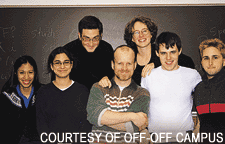Off-Off
Campus hosts
a revolutionary 40th revue
>
> The comedy troupe's 13th
generation keeps improv tradition alive.
 In
its 40th quarterly revue, members
of the Off-Off Campus comedy troupe chronicled the adventures
of a fictional family rock band. Their improv antics in The
Amazing Lipnicki Revolution cracked up Blue Gargoyle audiences
on Friday nights during the second half of this past winter
quarter.
In
its 40th quarterly revue, members
of the Off-Off Campus comedy troupe chronicled the adventures
of a fictional family rock band. Their improv antics in The
Amazing Lipnicki Revolution cracked up Blue Gargoyle audiences
on Friday nights during the second half of this past winter
quarter.
 |
The
Off-Off comedy troupe:
Back row, L-R: Avram Klein, Melanie MacBride.
Front row, L-R: Maya Ganguly, Chandrika Rajan, Joachim Riesthuis,
Robert Kennedy, Justin Seidner. |
The show's seven
cast members relied on audience feedback, character development,
and pre-plotted story lines as they improvised their way through
scenes pitting the Lipnickis against evil villains trying to
thwart the band's musical message of peace and love.
One night, for example,
the five Lipnickis confronted a thumbless cyborg and his henchman;
on another they faced a half-squid, half-human bad guy and his
evil sidekick. Not surprisingly, all the shows--except for one
where the band temporarily broke up--had the happy endings expected
of a sitcom-like performance.
The Revolution
featured the "13th generation" of Off-Off Campus: second-years
Maya Ganguly, Robert Kennedy, Melanie MacBride, and Chandrika
Rajan; third-years Avram Klein and Justin Seidner; and grad
student Joachim Riesthuis. Cast at the end of the 1998 autumn
quarter, they spent the following quarter in training before
performing a different flagship revue in each quarter since.
The first generation of Off-Off Campus dates back to 1986, when
Second City co-founder Bernard G. Sahlins, AB'43, challenged
students in his improv comedy course to revive the tradition
on campus.
The Lipnickis were
dreamed up over a summer break by fourth-year anthropology concentrator
Megan Biddinger, who directed the show with fourth-year biology
concentrator Beth Adams. Heavily influenced by Nick at Nite
reruns of the Partridge Family and Beatles movies like
Yellow Submarine and Help!, the Revolution
revue was picked by troupe members to follow autumn quarter's
Last Things First, a show about the drama and humor in
daily life.
Biddinger points
out that Revolution is not a "revue" in the traditional
sense of a performance grounded in loosely connected, scripted
scenes. Rather, she describes it as an improv piece based on
the commedia dell'arte tradition, relying on plot skeletons,
or scenarios, presented to actors in outline form only. The
scenarios typically revolve around the familiar narrative devices
of star-crossed lovers, mistaken identities, or sibling rivalry.
For each performance,
Revolution cast members traded off the roles of the same
stock characters: a widower, a heartthrob brother, his idealistic
sister, their crafty younger brother and innocent younger sister,
a bus-driving manager, a villain and his henchman, and a character
free to change his or her role based on the action. (Two cast
members played double roles.) The troupe worked in rehearsal
to develop characters "so rich and like an actual person that
you would know what drives them instinctively," says Biddinger.
Audience suggestions
made in response to questions like "What's my favorite food?"
kept the story moving. And in a new twist added this year, a
live band provided accompaniment. Though the band had prepared
music, the songs sung by the cast members--like one about yoga--were
based on what the audience threw out.
This spring, the
torch passes to the 14th generation, who plan to perform a more
traditional, scripted revue poking fun at society's manners
and mores.--C.S.

![]()
 In
its 40th quarterly revue, members
of the Off-Off Campus comedy troupe chronicled the adventures
of a fictional family rock band. Their improv antics in The
Amazing Lipnicki Revolution cracked up Blue Gargoyle audiences
on Friday nights during the second half of this past winter
quarter.
In
its 40th quarterly revue, members
of the Off-Off Campus comedy troupe chronicled the adventures
of a fictional family rock band. Their improv antics in The
Amazing Lipnicki Revolution cracked up Blue Gargoyle audiences
on Friday nights during the second half of this past winter
quarter.
